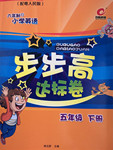题目内容
阅读理解
根据句意和所给词首字母,完成所缺单词。
Why are we always tired, do you know? Firstly, if we can't sleep w________, we will be tired. But we are often too b________. We can't f________ our work in the day and we must do it at n________. We go to bed l________ and get up e________. So we can't sleep well. Most people need at least eight hours and some more. If we sleep for only five or six hours a night. We will be tired.
Secondly when we are ill we will be t________. But we don't know we are ill. So if you are always tired, perhaps you are not h________. You'd better go to see a doctor.
Thirdly, perhaps you can't eat some kinds of food like eggs, nuts, meat, chocolate or coffee. If you are ill and tired after eating some food. Please don't eat it a________ to see if you are well.
At last, if the sir around you isn't nice and clean, you will feel tired. So Please open your w________ often or go out for a walk and you will feel better.
解析:
|
(w)ell,(b)usy,(f)inish,(n)ight,(l)ate,(e)arly,(t)ired,(h)ealthy,(a)gain,(w)indow |

 步步高达标卷系列答案
步步高达标卷系列答案【甲】
秦王谓唐雎日:“寡人以五百里之地易安陵,安陵君不听寡人,何也?且秦灭韩亡魏,而君以五十里之地存者,以君为长者,故不错意也。今吾以十倍之地,请广于君,而君逆寡人者,轻寡人与?”唐雎对日:“否,非若是也。安陵君受地于先王而守之,虽千里不敢易也,岂直五百里哉?”
秦王怫然怒,谓唐雎日:“公亦尝闻天子之怒乎?”唐雎对日:“臣未尝闻也。”秦王日:“天子之怒,伏尸百万,流血千里。”唐雎日:“大王尝闻布衣之怒乎?”秦王日:“布衣之怒,亦免冠徒跣,以头抢地耳。”唐雎曰:“此庸夫之怒也,非士之怒也。夫专诸之刺王僚也,彗星袭月;聂政之刺韩傀也,白虹贯日;要离之刺庆忌也,仓鹰击于殿上。此三子者,皆布衣之士也,怀怒未发,休祲降于天,与臣而将四矣。若士必怒,伏尸二人,流血五步,天下缟素,今日是也。”挺剑而起。
秦王色挠,长跪而谢之日:“先生坐!何至于此!寡人谕矣:夫韩、魏灭亡,而安陵以五十里之地存者,徒以有先生也。” (选自《唐雎不辱使命》)
【乙】
荆轲奉樊於期①头函,而秦武阳②奉地图匣,以次进。至陛③下,秦武阳色变振恐,群臣怪之,荆轲顾笑武阳,前为谢日:“北蛮夷之鄙人,未尝见天子,故振慑,愿大王少④假借⑤之,使毕使于前。”秦王谓轲曰:“起,取武阳所持图!”
轲既取图奉之,发⑥图,图穷而匕首见。因左手把秦王之袖,而右手持匕首揕⑦(zhèn)之。未至身,秦王惊,自引而起,绝⑧袖。拔剑,剑长,操其室。时恐急,剑坚,故不可立拔。
荆轲逐秦王,秦王还⑨柱而走。群臣惊愕,卒⑩起不意,尽失其度。而秦法,群臣侍殿上者,不得持尺兵;诸郎中11执兵,皆陈殿下,非有诏不得上。方急时不及召下兵以故荆轲逐秦王,而卒惶急无以击轲,而乃以手共搏之。(选自《荆轲刺秦王》)
【注释】①[樊於期]秦国将领,因得罪秦王逊到燕国。②[秦武阳]人名,又名秦舞阳,充任荆轲出使秦国的副手。③[陛]殿前的台阶。④[少]通“稍”。⑤[假借]在文中是“原谅” 的意思。⑥(发]打开。⑦[揕]用刀剑等刺。⑧[绝]挣断。⑨(还]通“环”,绕。⑩[卒]“猝”,突然。11[郎中]宫廷的侍卫。
【小题1】.根据上文,解释下列加点词语的意思。(4分)
(1)长跪而谢之( ) (2)安陵君受地于先王而守之( )
(3)寡人谕矣( ) (4)图穷而匕首见( )
【小题2】.用“/”给文中划线句子断句,划出两处。(2分)
方急时不及召下兵以故荆轲逐秦王。
【小题3】.翻译下列句子。(6分)
(1)怀怒未发,休祲降于天。
译文:______________________________________________________________________
(2)使毕使于前。
译文:______________________________________________________________________
【小题4】.下列对【甲】【乙】两文内容的理解与分析,不合文意的一项是()(2分)
| A.【甲】文所记叙的是强国和弱国之间的一场外交斗争,最后弱国取得胜利的故事。 |
| B.【乙】文所记叙的是荆轲刺秦王的经过:他拿着匕首,追赶秦王,而其余臣子则袖手旁观。 |
| C.【乙】文中记载了秦国的一条法律:带刀的侍卫一般不上殿,上殿的臣子不能带刀。 |
| D.【甲】【乙】两文在人物刻画上均用了对比的方法,其中【乙】文用秦武阳的“色变振恐”衬托出荆轲的沉着冷静。 |
| 阅读理解。 |
| Foreign visitors are often puzzled in Japan because most streets there don't havenames. In Japan, people use landmarks instead of street names. For example, the Japanese will say to travelers," Go straight down to the corner. Turn left at the big hotel and go past a fruit market. The post office is just across the bus stop. " In the Midwest of America, usually there are not many landmarks. There are no mountains. So the land is very flat. In many places there are no towns or buildings within miles. Instead of landmarks, people will tell you directions and distance. In Kansas (堪萨斯州) , for example, people will say, "Go north two miles. Turn east, and then go another mile. " People in Los Angeles, California, have no idea of distance on the map. They measure (测量) distance by telling time. "How far away is the post office?" you ask. "60h," they answer, "it's about five minutes from here, "You say, "Yes, but how many miles away is it?" They don't know. People in Greece sometimes do not even try to give directions because few visitors understand the Greek language. Instead of giving you the direction, a Greek will often say, "Follow me."Then he'll lead you through the streets of the city to the post office. Sometimes a person doesn't know the answer to your question. A New Yorker might say, "Sorry, I have no idea." But in Yucatan, Mexico (墨西哥), no one answers "I don't know. " People in Yucatan think "I don't know" is not polite. They usually give an answer, often a wrong one. A visitor can get very, very lost in Yucatan! One thing will help you everywhere. You might not understand a person's words, but maybe you can understand his body language. He or she will usually turn and then point in the correct direction. Go on in that direction and you may find the post office! |
| 1. What does the word "landmarks" mean? |
| A. Street names. B. Building names. C. Hotels,markets and bus stops. D. Buildings or places which are easily seen. |
| 2. 根据短文内容和句意,填入一个适当的单词。 |
| People in _____ prefer to tell you directions and distance if you ask for the way. |
| 3. 把下面的句子译成汉语。 |
| People in Greece (希腊)sometimes do not even try to give directions because few visitors understand the Greek language. _____________________________________________________________________________ |
| 4. 通过短文内容回答问题。 |
| Why don't people in Yucatan say,"I don't know" to a person who asks for the way? _____________________________________________________________________________ |
| 5. 通过短文内容回答问题。 |
| What does the passage mainly tell us? _____________________________________________________________________________ |